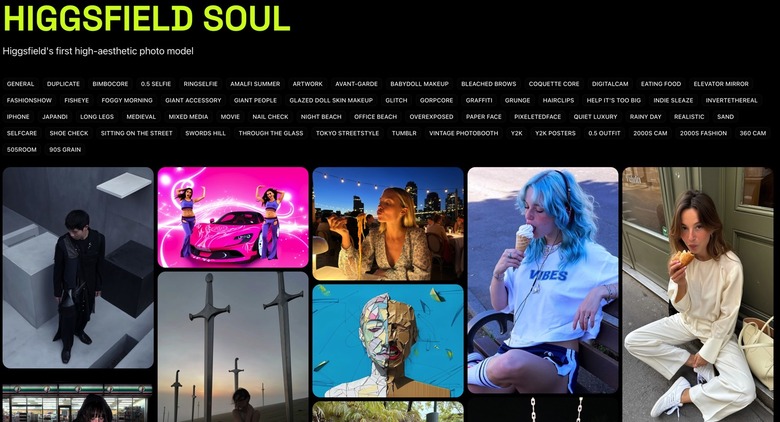Higgsfield Soul: The Next Generation of Image Generation Models
 CC: Check Here
CC: Check Here
In the rapidly evolving world of artificial intelligence, image generation has emerged as a captivating area of innovation. Among the latest entrants in this arena is the Higgsfield Soul image generation model, which has captured significant attention for its capabilities that seem to surpass those of established players like OpenAI. This blog aims to explore the functionalities of the Higgsfield Soul model, its advanced features, and how it stands out in comparison to OpenAI's image generation technologies.
Table of Contents
- Introduction to Higgsfield Soul
- Key Features of Higgsfield Soul
- Comparative Analysis: Higgsfield Soul vs OpenAI
- Real-World Applications of Higgsfield Soul
- Conclusion
Introduction to Higgsfield Soul
The Higgsfield Soul AI model is an advanced image generation system developed by Higgsfield AI, designed to create hyper-realistic images with a fashion-grade quality. It utilizes sophisticated algorithms to generate images that are not only visually appealing but also strikingly realistic.
“Higgsfield Soul is positioned as a direct competitor to traditional photography, boasting an unparalleled level of realism.”
What Sets Higgsfield Soul Apart?
- Specialization in Realism: The model is specifically fine-tuned for "fashion-grade realism," which means it is optimized to produce images that can rival professional photography.
- User-Friendly Presets: Higgsfield Soul includes over 50 presets, enabling users to generate desired images more efficiently and effectively.
- Image Quality: Users have reported that the realism of Higgsfield Soul images surpasses that of other AI generators, including those developed by OpenAI and ChatGPT, often eliminating the "plasticky" look found in their outputs.
Key Features of Higgsfield Soul
The Higgsfield Soul model incorporates various features that enhance its usability and output quality:
1. Text-to-Image Generation
Higgsfield Soul primarily supports text-to-image generation, allowing users to input textual descriptions and receive high-quality images based on those prompts.
2. Multiple Presets
With more than 50 presets available, users can streamline their creative processes. These presets cover a wide range of styles, including:
- Fashion
- Abstract art
- Realistic portraits
- Landscape photography
3. High Aesthetic Standards
The AI model is designed to maintain high aesthetic standards, making it suitable for professional content creators, advertisers, and artists who demand top-tier quality.
4. Realism in Image Generation
One of the standout capabilities of Higgsfield Soul is its ability to create images that appear strikingly real. This characteristic makes it particularly appealing for users who require lifelike representations, as evidenced by its ability to create pixelated faces without losing detail.
5. User Engagement and Community
Higgsfield AI encourages user engagement through challenges and community events, allowing users to demonstrate their creativity and potentially win prizes. Recently, Higgsfield launched a $15,000 prize challenge to stimulate creativity within its community.
Comparative Analysis: Higgsfield Soul vs OpenAI
When comparing the capabilities of Higgsfield Soul with those of OpenAI's image generation models, several distinctions emerge:
1. Realism and Quality
- Higgsfield Soul: Known for its superior realism and aesthetic quality, often producing images that appear as if they were taken with a high-end camera.
- OpenAI: While OpenAI's models, like DALL-E, are also capable of generating impressive images, they may occasionally exhibit a less realistic aesthetic, especially in complex scenarios.
2. Presets and Customization
- Higgsfield Soul: Offers a vast array of presets that streamline the image creation process.
- OpenAI: Typically relies on user input for customization, without the same level of preset options.
3. User Experience
- Higgsfield Soul: Designed with user experience in mind, allowing for faster generation times and a more intuitive interface.
- OpenAI: While user-friendly, may not provide the same speed in generating high-quality images.
4. Use Cases
- Higgsfield Soul: Particularly well-suited for fashion, advertising, and professional photography needs.
- OpenAI: More versatile in application across various domains, including educational content and artistic explorations.
Real-World Applications of Higgsfield Soul
The Higgsfield Soul model’s capabilities have made it a valuable tool across various domains:
1. Fashion Industry
Designers and brands are leveraging Higgsfield Soul to create marketing materials, product visuals, and social media content that require high visual appeal.
2. Content Creation
Content creators, including bloggers and influencers, can generate striking images for their platforms, enhancing engagement with their audience.
3. Advertising
Agencies are using Higgsfield Soul to produce high-quality visuals for campaigns, ensuring that their advertisements stand out in crowded markets.
4. Artwork and Design
Artists are exploring the model to generate unique art pieces, pushing the boundaries of traditional artistic expression.
Conclusion
The Higgsfield Soul image generation model presents an exciting advancement in the realm of AI-generated imagery, offering capabilities that challenge and often surpass those of established models like OpenAI. With its focus on realism, user-friendly features, and versatility across various applications, Higgsfield Soul is poised to become a go-to tool for professionals in the fashion, content creation, advertising, and art sectors.
As technology continues to evolve, it will be fascinating to observe how these models develop, the standards they set for visual representation, and the creative possibilities they unlock for users worldwide. The future of image generation is bright, and Higgsfield Soul is leading the charge.
For more information, you can check the original sources Higgsfield Soul AI and OpenAI..

